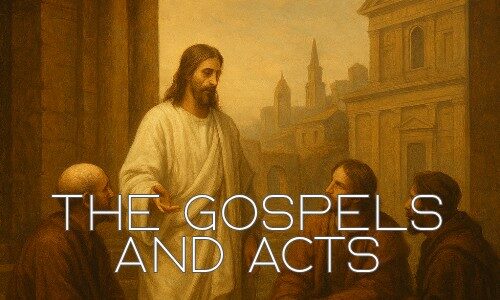This course focuses on the four Gospels (Matthew, Mark, Luke, and John) and the book of Acts. Students analyze the unique portraits of Jesus presented in each Gospel and the historical and theological development of the early church.
The Gospels and Acts
Level: Master’s
Course Length: 10 weeks (approx. 120–150 hours total if following full module path)
Delivery Mode: Competency-based, self-paced with required final exam
Course Overview
This course provides a detailed study of the four Gospels (Matthew, Mark, Luke, John) and the Acts of the Apostles. Students will analyze the distinct portraits of Jesus presented in each Gospel, explore their theological emphases, and study the historical and theological development of the early church through Acts.
The course is competency-based:
-
Students may complete all modules and assignments to prepare for the final exam, or
-
If students already have a sufficient background, they may skip directly to the final competency exam.
Competency is demonstrated through the ability to compare Gospel accounts, interpret selected passages, and analyze the theological message of Acts.
Learning Outcomes
By the end of this course, students will be able to:
-
Summarize the content and structure of each Gospel and Acts.
-
Compare and contrast the theological emphases and portraits of Jesus in the Gospels.
-
Explain the historical and cultural contexts of first-century Palestine and the Greco-Roman world.
-
Analyze the theological themes of the Gospels and Acts (kingdom of God, salvation, Holy Spirit, mission).
-
Demonstrate interpretive competence by integrating literary and theological analysis.
Weekly Breakdown (10 Weeks)
Week 1: Introduction to the Gospels and Acts (8–10 hours)
-
Canonical arrangement and authorship.
-
Synoptic problem and Johannine distinctiveness.
-
Theological significance of Acts.
-
Competency: Identify authorship debates and historical context.
Week 2: The Gospel of Matthew (12–14 hours)
-
Authorship, audience, and structure.
-
Themes: Jesus as Messiah, fulfillment of prophecy, kingdom ethics.
-
Competency: Summarize Matthew’s theological contribution.
Week 3: The Gospel of Mark (10–12 hours)
-
Characteristics of Markan style.
-
Themes: suffering servant, urgency of the Gospel, discipleship.
-
Competency: Analyze Mark’s portrait of Jesus and discipleship.
Week 4: The Gospel of Luke (Part 1) (12–14 hours)
-
Luke’s prologue and purpose.
-
Themes: salvation for all, Holy Spirit, concern for marginalized groups.
-
Competency: Identify key theological emphases in Luke.
Week 5: The Gospel of Luke (Part 2: Acts Introduction) (12–14 hours)
-
Luke–Acts as a two-volume work.
-
Transition from the Gospel to the story of the early church.
-
Competency: Explain the unity of Luke–Acts.
Week 6: The Gospel of John (12–14 hours)
-
Distinctive features of John compared to the Synoptics.
-
Themes: Word made flesh, eternal life, signs, “I Am” statements.
-
Competency: Contrast Johannine theology with Synoptic perspectives.
Week 7: The Book of Acts (Part 1: Jerusalem to Judea) (12–14 hours)
-
Pentecost and the birth of the church.
-
Apostolic preaching and miracles.
-
Persecution and expansion in Jerusalem and Judea.
-
Competency: Trace theological themes in the early Jerusalem church.
Week 8: The Book of Acts (Part 2: Mission to the Gentiles) (12–14 hours)
-
Conversion of Paul.
-
Missionary journeys and expansion into Gentile territories.
-
Competency: Explain the significance of Paul’s mission in Acts.
Week 9: The Book of Acts (Part 3: To the Ends of the Earth) (10–12 hours)
-
Paul’s arrest and defense.
-
The Gospel’s spread to Rome.
-
Competency: Describe the theological purpose of Acts’ conclusion.
Week 10: Integration & Competency Exam Prep (10–12 hours)
-
Comparing Gospel portraits of Jesus.
-
Themes of mission, Spirit, and kingdom across Luke–Acts.
-
Case studies of selected passages.
-
Final Competency Exam (required).
Assessment
-
Competency Exam (100%): Students must demonstrate mastery by interpreting representative passages, comparing Gospel theologies, and analyzing Acts’ role in early church history.
-
Optional formative assessments: quizzes, study reflections, and practice translation/analysis (not required).
Curriculum
- 10 Sections
- 23 Lessons
- Lifetime
- Week 1: Introduction to the Gospels and Acts (8–10 hours)Canonical arrangement and authorship. Synoptic problem and Johannine distinctiveness. Theological significance of Acts.4
- Week 2: The Gospel of Matthew (12–14 hours)Authorship, audience, and structure. Themes: Jesus as Messiah, fulfillment of prophecy, kingdom ethics.3
- Week 3: The Gospel of Mark (10–12 hours)Characteristics of Markan style. Themes: suffering servant, urgency of the Gospel, discipleship.3
- Week 4: The Gospel of Luke (Part 1) (12–14 hours)Luke’s prologue and purpose. Themes: salvation for all, Holy Spirit, concern for marginalized groups.3
- Week 5: The Gospel of Luke (Part 2: Acts Introduction) (12–14 hours)3
- Week 6: The Gospel of John (12–14 hours)Distinctive features of John compared to the Synoptics. Themes: Word made flesh, eternal life, signs, “I Am” statements.3
- Week 7: The Book of Acts (Part 1: Jerusalem to Judea) (12–14 hours)Pentecost and the birth of the church. Apostolic preaching and miracles. Persecution and expansion in Jerusalem and Judea.4
- Week 8: The Book of Acts (Part 2: Mission to the Gentiles) (12–14 hours)Conversion of Paul. Missionary journeys and expansion into Gentile territories.3
- Week 9: The Book of Acts (Part 3: To the Ends of the Earth) (10–12 hours)Paul’s arrest and defense. The Gospel’s spread to Rome.3
- Week 10: Integration & Competency Exam Prep (10–12 hours)4
Instructor

